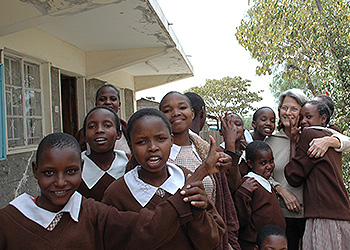 Since 2000, MGEF has supported the education of over 280 Maasai girls from primary school through post-secondary education. MGEF measures its success by the number of students that complete their education and have the knowledge and skills to enter the workforce in Kenya. Seventy six of our students have graduated from post-secondary schools and are working and supporting their families. They serve in the following fields: education, health, business, community development, and culinary arts. Current post-secondary students have an even more expansive list of concentrations: telecommunications, accounting, nutrition, education, hotel management/tourism, medicine, public relations, social work, business administration, and secretarial.
Since 2000, MGEF has supported the education of over 280 Maasai girls from primary school through post-secondary education. MGEF measures its success by the number of students that complete their education and have the knowledge and skills to enter the workforce in Kenya. Seventy six of our students have graduated from post-secondary schools and are working and supporting their families. They serve in the following fields: education, health, business, community development, and culinary arts. Current post-secondary students have an even more expansive list of concentrations: telecommunications, accounting, nutrition, education, hotel management/tourism, medicine, public relations, social work, business administration, and secretarial.
As MGEF scholarship students graduate from colleges and universities, they are demonstrating to the Maasai community the greater economic value of educating a daughter rather than marrying her off for a one-time dowry. MGEF alumni are, by their example, are role models to younger girls. They are also changing the way people think about educating girls, and that change is resulting in more girls being enrolled in school.
As of December 2024:
- 302 Students have been enrolled in schools through the MGEF Scholarship Program
- 160 active students in 2024 – 34 primary, 66 secondary, 2 vocational, 56 post-secondary and 2 pending sport-secondary waiting for acceptance to an institution of higher learning
- 175 students have graduated high school
- 257 students have graduated primary school
- 41 students have earned their degrees from universities or colleges
- 26 students have earned their diplomas from universities or colleges
- 29 students have earned their certificates from universities or technical schools
In 2006 we began offering Life Skills Workshops to address the social customs and cultural beliefs that prevent girls from getting an education, including teen pregnancy, early marriage, FGM, and HIV/AIDS. In 2009, we added workshops for boys and for chiefs and elders, adjusted for gender and age. To date, more than 7,226 girls, 6,249 boys, and 2,076 chiefs and elders have attended these workshops. In 2012, MGEF launched a similar workshop for Maasai women, which is held in conjunction with the chiefs and elders program. To date 2,831 women have attended these workshops.
